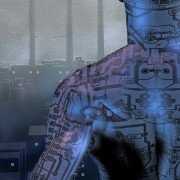What We’re Reading: The Martian
TDW: The Martian by Andy Weir is one of those crazy self-publishing success stories. It started as a serial on the author’s website, before fans prompted him to put it up on Amazon, which he did for the low, low price of 0.99c. Soon it got picked up for a print deal and is currently in production as a Ridley Scott movie starring Matt Damon. That is quite insane. But it isn’t without reason.

Click to view in Goodreads
The Martian focuses on NASA’s endeavours as they try save one of their astronauts after he becomes stranded in a freak dust storm on the red planet. It’s like Castaway set on Mars, only if Tom Hanks were a super-intelligent, wise-cracking scientist with the stakes much, much higher. There’s no Wilson to talk to, but all the input from our protagonist, Mark Watney, is via audio logs he delivers while attempting to survive where no man has survived before. It’s an entertaining mix between hard SF and action, with equal parts Mark going into meticulous detail (for example, exactly how many potatoes he’s going to have to grow, and the methods by which he will do so) and fast-paced action when the shit hits the fan. Andy Weir, the author, deftly balances the light-hearted with the serious, scientific speculation with high-octane drama. It’s a rollicking read with a few niggles. The dialogue was off at times, a little crass, especially given we are dealing with professionals. At times the pacing was also a little off, and sometimes switching back between monologues and those back on Earth was jolting. But I suppose these are more stylistic choices, and given it’s quick transition to the mass market I presume the editors were disinclined to change much.
Interestingly though the best part of the book is that I listened to it in audiobook format. The narrator is top class, capable of the variety of voices and accents needed. Obviously it works best when Mark Watney is talking directly to you, when it feels like you are the recipient of his audio logs. It shifted gear when other characters were brought in, but I thought it was a nice touch to a first person account. Compare this to my audiobook experience with Dune and it’s a completely different story. One issue of Dune is that the character perspective shifts within a scene. When listening to this it’s even more apparent and off-putting. Aside from that the narrator just didn’t succeed in making the story compelling. From my experience audiobooks works best for non-fiction formats (except when tables and graphs are concerned. See: Capital in the 21st Century) and when the fiction is animated and/or in first-person, as in The Martian.
My final recommendation is that you consume The Martian in whatever format you choose, with a note that it is particularly suited to audiobooks. I also expect it will make a great movie, and I am excited to see what Ridley Scott does with it (despite Prometheus). More than that, if Matt Damon can pull off the character of Mark Watney then it will be a surefire success . This is a book that proves that hard SF can still be appealing to a wider audience, if approached in the right way.
Chris: (Added 8th July 2015)
One thing that kind of annoys about the broad spec-fic field is how difficult it seems to move away from the continual discussion and debate about ‘genre’. Which books falls into what category? Who can claim allegiance to what? There are famous examples of this, like the ‘dispute’ between Ursula le Guin and Margaret Atwood about whether Atwood writes science fiction. And I don’t just mean the supposed distinction between ‘literary’ and ‘genre’ fiction, but also the hierarchies within spec-fic that many people buy into.
And so I frustrated myself while reading Andy Weir’s The Martian because I couldn’t move away from genre. It’s a book that (as I recently learnt from fellow Fantastican David Henley’s chat on ABC a few nights ago) The Martian falls into what is termed ‘mundane sci fi’, a kind of hard sci fi that strictly adheres to the laws of physics and the development of technology as we now know them.
That is one of the most remarkable aspects of The Martian. Weir really did his homework. There’s an astounding amount of thought, calculation, and planning that went into this book. Mentions of contingencies that never come about are nevertheless fully factored into the plans of our intrepid astronaut, Mark Watney. Even things Watney didn’t think of, Weir has. So, when something goes catastrophically wrong, it’s almost always due to an error of calculation on Watney’s part and is thus explained in Watney’s hindsight. This book is a realisation of the conditions on Mars that is so thorough it’s possible to ask yourself by the end why we haven’t been there already. Long story short, fans of sf who are in it for dramatic celebrations of science will probably love The Martian.
It’s a good read. But I would contend (sorry, Tom) that its flaws are more than niggling. Firstly, the routine of ‘epic-problem-resolved-by-ingenious-solution’ becomes a little tired by about page 50, and that’s because there’s not much else going on in the book at that point. Every chapter is Watney explaining how he’s going survive the next challenge. Remember those maths tests? ‘If a train is travelling at 50km per hour…’ and so on. Reading The Martian is like reading a series of those, only they’re on an epic, life-or-death scale involving serious amounts of maths and knowledge about botany, chemistry and all sorts of other stuff (though, for the record, Watney regularly informs the reader to ‘trust him’ on the maths, so don’t expect to review mathematical proofs). There’s nothing that can’t be resolved if clear-thinking scientific rationalism is applied to it. Don’t get me wrong: it’s impressive. But after a while it becomes a distraction.
That does bring me to my second major gripe with The Martian. Watney is great at solving problems, but there are certain problems that implausibly never seem to arise, namely problems with Watney.
As Tom pointed out, there’s no Wilson to talk to. If Watney experiences any psychological strain in facing almost-certain death every day while stranded alone on an entire dead planet for two years with nothing to do but think about whether he’ll survive (and beat up on disco music) – if this causes him any stress whatsoever, you’d be forgiven for missing it. Okay, he might hide it behind jokes, and occasionally he admits that he misses his old crew. Aside from that, Watney appears to be a problem-solving machine, replaceable with a wise-cracking robot. There’s not much depth to the guy. Which kind of kills the core idea – real survival in an environment like Mars wouldn’t just be about resolving the hard science of it.
Having said all that, it’s a book worth reading and I recommend it. But while I was reading it I kept coming back to the ‘issue’ of genre because it feels almost self-consciously designed for the mundane or hard sf audience. And while there’s nothing wrong with a writer pitching to a certain market, I can’t help but wonder if some of these gripes of mine might have been addressed if Weir hadn’t been so keen to stick to certain tropes.
Which I suppose is no better than saying ‘It wasn’t my favourite cause I don’t like those kinds of books,’ again falling into the genre trap.
Have you read The Martian? Let us know what you thought in the comments.








